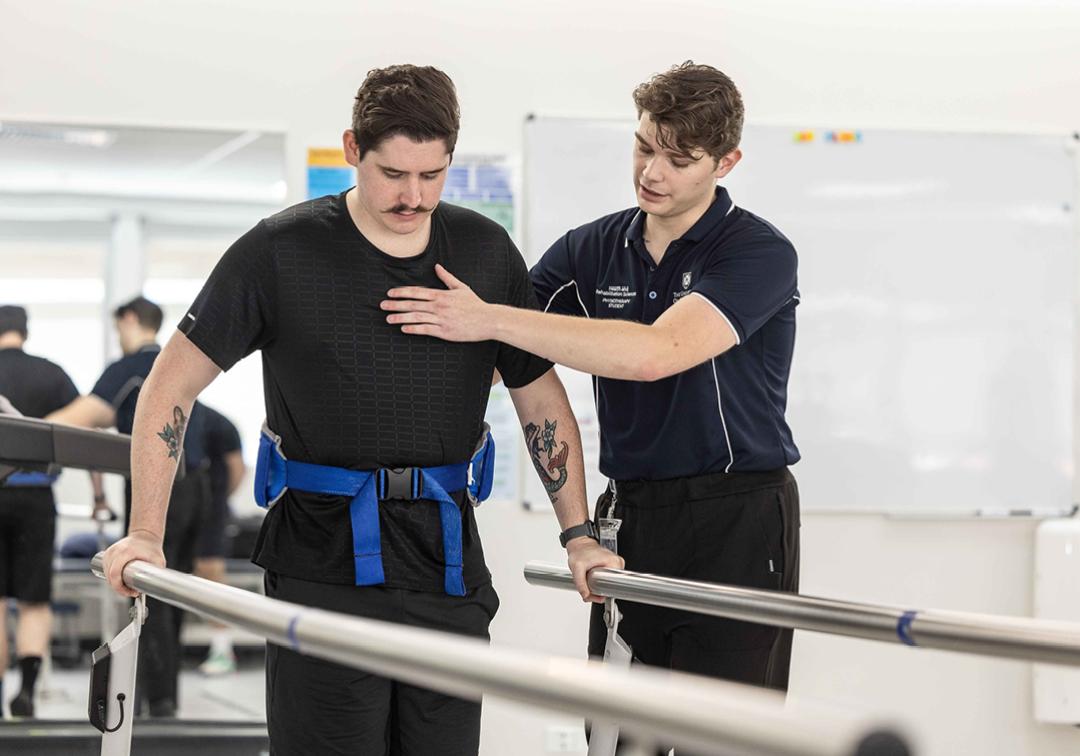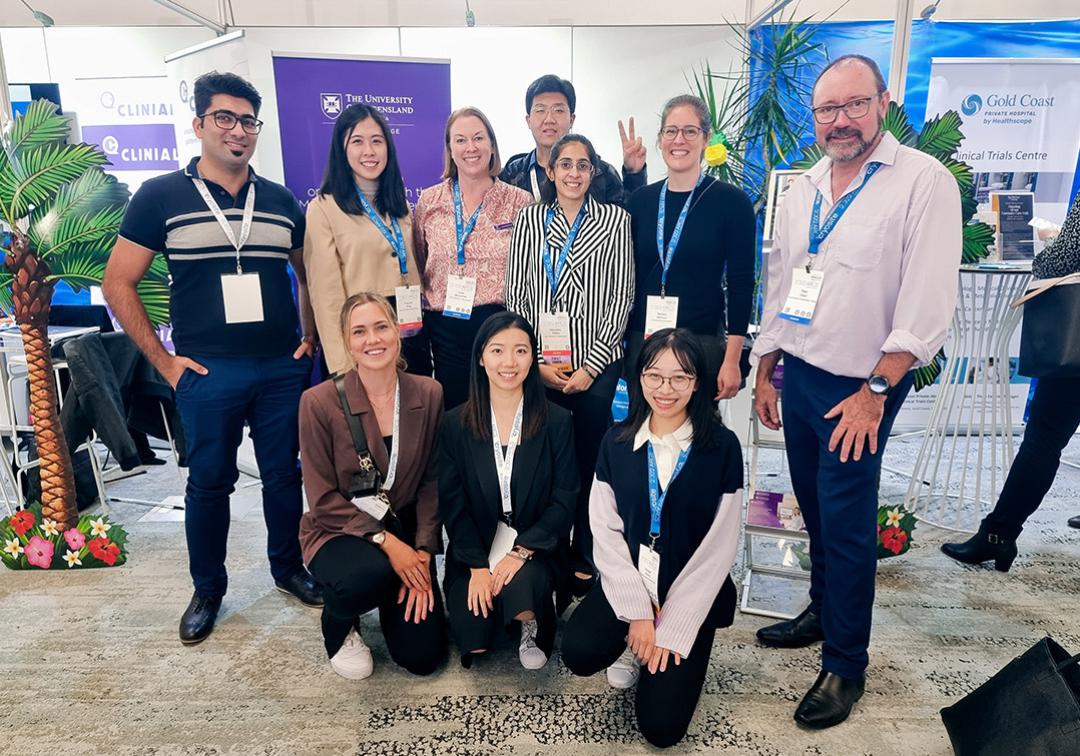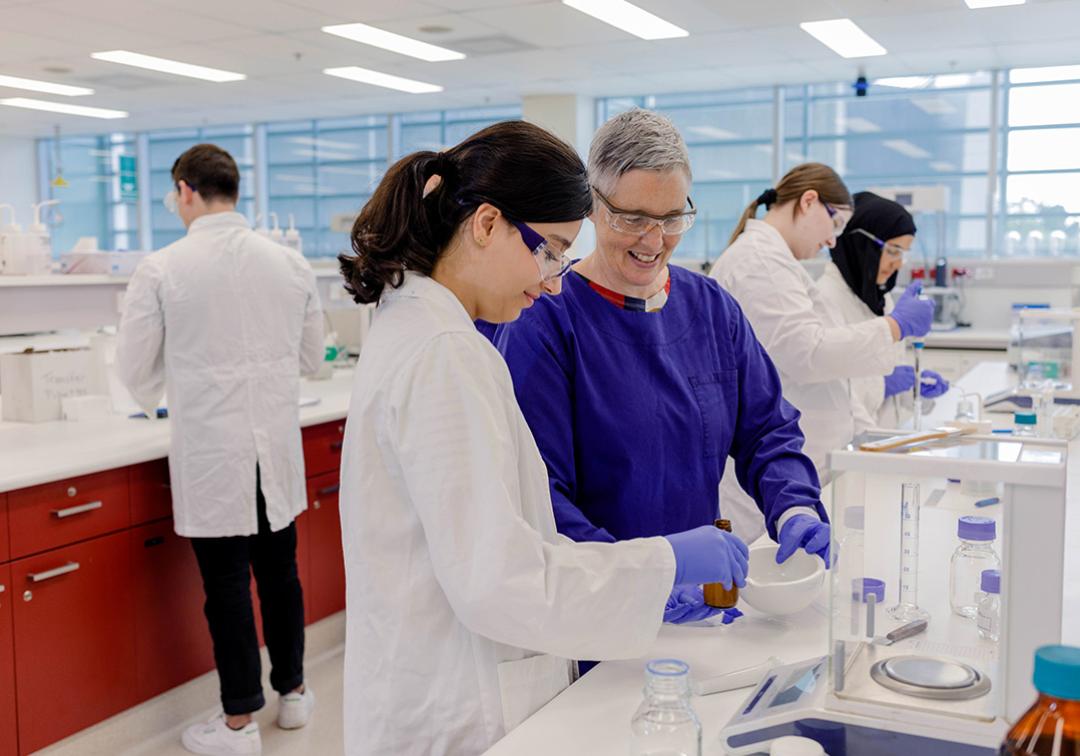
Master of Pharmaceutical Industry Practice
Overview
Break into the pharmaceutical industry with a competitive edge to succeed in your career.
The award-winning Master of Pharmaceutical Industry Practice will equip you with industry-ready skills to support a career in the medicines and devices development sector.
You'll gain insight into contemporary industry practice, studying:
- ethics and governance
- regulatory, business and health economics
- drug design and formulation
- manufacturing and packaging
- clinical drug development, including safety (pharmacovigilance) and biometrics from preclinical (animal research) to post-registration.
As part of this 2-year full-time degree, you’ll have the option to apply for placement experience, research or coursework in your second year—depending on your progress in your first year and completion of career preparation interviews and workshops.
If you secure an industry placement, you’ll complete a minimum of 12 weeks of hands-on experience and gain insights into contemporary industry practice across areas such as drug discovery or clinical trials, medical and regulatory affairs, or pharmacovigilance.
You’ll be taught by leading educators, who were awarded the UQ Teaching and Learning Award for Programs that Value and Enhance Student Employability.
With the industry networking opportunities provided throughout the program, and unique placement and research opportunities or postgraduate coursework available, you’ll feel connected and ready to launch your career in the pharmaceutical and biotechnology sector.
Program highlights
- Benefit from extended placements through our impressive partnership network (if eligible).
- Learn from award-winning lecturers and internationally renowned researchers.
- Join the highest ranked Australian university for research impact in pharmacy and pharmacology.
- Learn the stages of drug or device development and the lifecycle management process—from understanding how need drives the discovery process, through pre-clinical development, to post-registration surveillance.
How you'll learn
Your learning experiences are designed to best suit the learning outcomes of the courses you choose.
- Lectures
- Work placements
- Online study
- Research experience
- Fieldwork
- Studios
Placements and work experience
What you'll study
At UQ, degrees are called 'programs' and subjects are called 'courses'. Here's a sample of the courses you could study in this program:
- Drug Design and Formulation
- Pre-Clinical Drug Development
- Post-registration Life Cycle Management
- Device Development, Drug Manufacturing, Regulatory Affairs and Governance
Career possibilities
Postgraduate study can take you anywhere. Here are some of the careers you could be on your way to:
- Clinical trials research assistant
- Clinical research officer
- Regulatory affairs associate
- Quality assurance officer
- Quality control officer
- Drug safety associate
- Research assistant
- Project manager
- Medical affairs/medical science liaison
Average annual salary range
Research Assistant
seek.com.au
Average annual salary range
Quality Assurance Coordinator
seek.com.au
Events
See all events
9 June
Master of Physiotherapy information webinar
Stories
See all stories
Study tips
4 reasons to study a Master of Pharmaceutical Industry Practice
5-minute read

Careers
How to start a career in the pharmaceutical industry
8-minute read
Stories
See all stories
Study tips
4 reasons to study a Master of Pharmaceutical Industry Practice
5-minute read

Careers
How to start a career in the pharmaceutical industry
8-minute read
Entry requirements
Entry requirements
To be eligible for entry, you'll need:
- A bachelor's degree (or equivalent) in Science, engineering, medical/biomedical science, health sciences, pharmacy or pharmaceutical science, or equivalent.
- The Graduate Certificate in Pharmaceutical Industry Practice from UQ
- A bachelor's degree (or equivalent) in Science, engineering, medical/biomedical science, health sciences, pharmacy or pharmaceutical science, or equivalent.
- The Graduate Certificate in Pharmaceutical Industry Practice from UQ
English language requirements
IELTS overall 6.5; reading 6; writing 6; speaking 6; listening 6. For other English Language Proficiency Tests and Scores approved for UQ
TOEFL iBT (including Paper Edition) - Overall 87, listening 19, reading 19, writing 21 and speaking 19.
PTE Academic - Overall Score of 64 and 60 in all sub bands.
BE - A minimum overall grade of 4 plus a minimum grade of C in all macro skills.
CES - Overall 176 and 169 in all sub bands.
OET is not accepted.
There are other ways to meet the English language requirements. For some programs, additional conditions apply.
Inherent requirements
To complete this degree, you have to meet its inherent requirements by demonstrating essential skills and attributes. Read the inherent requirements before you apply.
Student visas
International students who are accepted into full-time study in the Master of Pharmaceutical Industry Practice are eligible to apply for an Australian student visa (subclass 500).
There are a number of requirements you must satisfy before a visa is granted, including the Genuine Student (GS) requirement.
Need help meeting the entry requirements?
Additional application information
Additional application information
Fees and Scholarships
Indicative annual fee
Approximate yearly cost of tuition (16 units). Your fees will vary according to your selected courses and study load. Fees are reviewed each year and may increase.
$9,540
2026
Approximate yearly cost of full-time tuition (16 units). Your fees will vary according to your study load. Fees are reviewed each year and may increase.
AUD $50,032
2026
Government assistance
Financial aid
As an international student, you might be eligible for financial aid – either from your home country, or from the Australian Government.
HECS-HELP
Domestic places in the Master of Pharmaceutical Industry Practice are Commonwealth supported, as long as you meet all Commonwealth supported place eligibility requirements.
This means the cost of your education is shared between you and the Australian Government. Instead of tuition fees, Commonwealth supported students pay what are called student contribution amounts.
If you have a Commonwealth supported place, you may also be eligible for HECS-HELP. This is an Australian Government loan scheme to assist eligible students with the cost of their student contribution amounts.
Centrelink support
The Australian Government offers a number of income-support payments to eligible Australian university students.
Scholarships
You may be eligible for more than 100 scholarships, including:
How to apply
Applying online
All international applications should be submitted to UQ. If you prefer, you can use an approved UQ agent near you.
The program code for the Master of Pharmaceutical Industry Practice is 5703.
Applying online
All domestic applications should be submitted to UQ.
The program code for the Master of Pharmaceutical Industry Practice is 5703.
Important dates
The closing date for this program is:
- To commence study in Semester 1 - January 31 of the year of commencement.
- To commence study in Semester 2 - June 30 of the year of commencement.
Visa processing times vary. Apply and accept your offer as early as you can.
To learn more about UQ dates, including semester start dates, view the Academic Calendar.
Important dates
The closing date for this program is:
- To commence study in Semester 1 - January 31 of the year of commencement.
- To commence study in Semester 2 - June 30 of the year of commencement.
To learn more about UQ dates, including semester start dates, view the Academic Calendar.
Aboriginal and Torres Strait Islander applicants
For support with applying – or if you have any questions about university life – get in touch with our Aboriginal and Torres Strait Islander Studies (ATSIS) Unit.
Explore other programs
Express yourself. And your interest.
They say choosing a degree is hard, which is why we've made it easy. Register your interest and we'll send you everything you need to know about applying to UQ.










